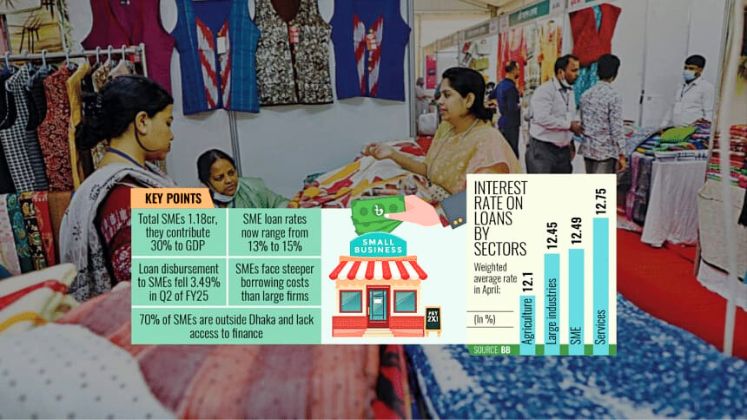
Small and medium enterprises (SMEs), the backbone of Bangladesh’s economy and employment, face mounting challenges as high interest rates threaten their growth and sustainability. Despite government claims of prioritising affordable credit access for these businesses, SMEs continue to pay some of the highest borrowing costs across sectors.
According to recent data, over 1.18 crore SMEs operate across the country, contributing approximately 30% to GDP and employing around 2.40 crore people, with 70% of these businesses located outside the capital. However, banks charge interest rates ranging from 13 to 15% for SME loans, significantly higher than rates for agriculture, large industries and services, which hover around 12% or less.
Finance experts cite higher operational costs and regional dispersal as key reasons for these elevated rates. Kamrul Mehedi, Deputy Managing Director at City Bank Ltd., explained that SME loan interest rates are typically 1.5 to 2.5 percentage points above corporate loans due to increased management expenses, processing fees and the need for personalised service, especially in rural areas.
Bangladesh Bank data shows that the weighted average interest rate for SMEs was 12.49% in April 2024, compared to 11.98% for agriculture and 12.45% for large industries. Despite the higher costs, many bankers acknowledge the need to lower these rates. Arief Hossain Khan, Spokesperson for Bangladesh Bank, confirmed that the central bank encourages banks to reduce SME interest rates, but operational expenses remain a challenge.
Official figures reveal a decline in SME loan disbursements, dropping 3.49% year-on-year in the October-December quarter of FY 2024-25. Banks disbursed Taka 62,581 crore during this period, down from Taka 64,842 crore in the same quarter last year, highlighting growing lending hesitations.
Bankers cite structural challenges, including high operational costs, limited outreach outside Dhaka and perceived risks as reasons for reluctance to lend. Trade leaders point out that the credit assessment process is flawed and that high processing fees, up to 10% for small loans, further hinder access. For example, processing a Taka 1 lakh loan can cost banks Taka 10,000, compared to just 0.004% for large corporate loans.
Abdul Momen, Additional Managing Director at BRAC Bank, notes that their SME loans, comprising micro and small entrepreneurs, carry interest rates between 13 and 15%, which they consider a balance between affordability and operational costs. BRAC Bank’s SME portfolio exceeds Taka 32,000 crore, serving nearly 2.5 lakh clients, with about 90% of loans directed toward micro and small entrepreneurs often overlooked by traditional lenders.
Despite these efforts, government agencies acknowledge that more needs to be done. Mushfiqur Rahman, Chairperson of the SME Foundation, emphasised that micro and small businesses struggle to access affordable credit due to high interest rates, strict collateral requirements and cautious lending policies. The Foundation’s programs, including a credit wholesaling initiative offering 9% loans and Covid stimulus support, have helped some entrepreneurs, with women entrepreneurs receiving 25-30% of disbursed loans.
Mushfiqur stressed that with 70% of entrepreneurs outside Dhaka, expanding outreach is crucial. He called for increased government support to facilitate broader access to affordable credit, ensuring the stability and growth of Bangladesh’s vital SME sector amidst rising borrowing costs and economic uncertainties.






